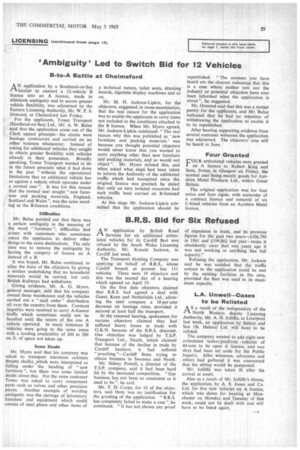'Ambiguity' Led to Switch Bid for 12 Vehicles
Page 59

If you've noticed an error in this article please click here to report it so we can fix it.
B-to-A Battle at Chelmsford AN . application by a Southend-on-Sea haulier to convert a 12-vehicle B licence into an A licence, made to eliminate ambiguity and to secure greater vehicle flexibility, was adjourned by the Eastern Licensing Authority, Mr. W. P. S. Ormond, at Chelmsford last Friday.
For the applicants, Tower Transport (Southend-on-Sea) Ltd., Mr. A. W. Balne said that the application arose out of the Clark appeal principle—his clients were haulage contractors and carried on no other business whatsoever. Instead of asking for additional vehicles they sought to obtain greater flexibility with vehicles already in their possession, Broadly speaking, Tower Transport wanted to do in the future precisely what it had done in the past "without the operational limitations that an additional vehicle has as against a vehicle which operates under a normal user ". It was for this reason that the normal user sought " new furniture and packing materials, England, Scotland and Wales ", was the same wording as the B-licence conditions.
Difficulties Mr. Balne pointed out that there was a certain ambiguity in the meaning of the word " furniture "; difficulties had arisen with customers who sometimes asked the applicants to deliver other things to the same destinations. The only cure was to remove the ambiguity by having the category of licence an A instead of a B.
It was hoped, Mr. Balne continued, to allay the fears of the objectors by giving a written undertaking that no household removals would be carried, but only British Railways had withdrawn.
Giving evidence, Mr. A. G. Myers, general manager, skid that his company owned three warehouses and the vehicles carried out a 'mail order" distribution all over the country from them. Constant inquiries were received to carry A-licence traffic which sometimes could not be handled until the return of the one A vehicle operated. In many instances B vehicles were going to the same areas with a loading availability of 200 to 300 Cu. ft. of space not taken up.
Some Doubt Mr. Myers said that his company was asked to transport television cabinets (empty shells), ,which were interpreted as falling under the heading of "new furniture ", but there was some limited doubt about this. For the same customer Tower was asked to carry component parts such as valves and other precision pieces. Another example of wording ambiguity was the carriage of laboratory furniture and equipment which could consist of steel plates and other items of a technical nature, toilet seats, draining boards, cigarette display machines and so on.
Mr. M. H. Jackson-Lipkin, for the objectors, suggested, in cross-examination, that the real reason for the application was to enable the applicants to carry items not included in the conditions attached to the B licence. When Mr. Myers agreed, Mr. Jackson-Lipkin continued: "The real reason why this was published as new furniture and packing materials' was because you thought potential objectors would never know that you wanted to carry anything other than new furniture and packing materials, and so would not object ". Mr. Myers refuted this, and when asked what steps had been taken to inform the Authority of the additional traffic which had transpired since the original licence was granted, he stated that only on very isolated occasions had such traffic been carried on B-licensed vehicles.
At this stage Mr. Jackson-Lipkin submitted that the application should be republished. "The answers you have heard are the clearest indication that this is a case where neither you nor the industry or potential objectors have ever been informed what the application is about ", he suggested.
Mr. Ormond said that this was a matter purely for the applicants, and Mr. Baffle indicated that he had no intention of withdrawing the application to enable it to be republished.
After hearing supporting evidence from several customer witnesses the application was adjourned. The objectors' case will be heard in June.
Four Granted FOUR articulated vehicles were granted on A licence to Robert King and Sons, Irvine, in Glasgow on Friday, the normal user being mainly goods for Ayrshire Metal Products Ltd., within Great Britain.
The original application was for four artics and four rigids, with surrender of a contract licence and removal of six C-hired vehicles from an Ayrshire Metal licence.




















































































































































































































































